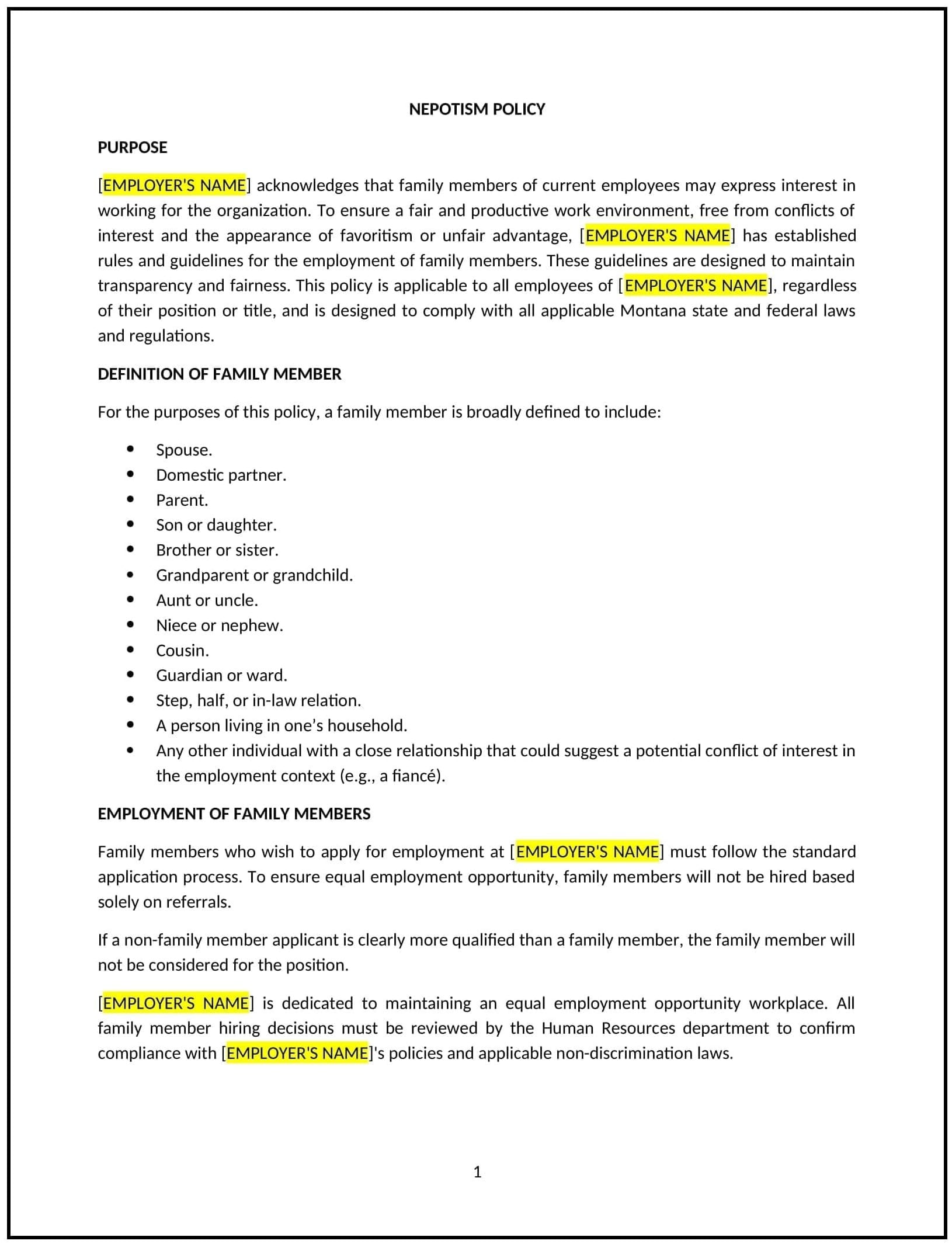Got contracts to review? While you're here for policies, let Cobrief make contract review effortless—start your free review now.

Customize this template for free
Nepotism policy (Montana)
A nepotism policy helps Montana businesses manage relationships between employees who are related or have close personal connections, ensuring fairness and avoiding conflicts of interest in hiring, promotions, and decision-making. This policy outlines how family members or close relationships should be handled within the workplace to maintain transparency, equity, and professionalism.
By implementing this policy, businesses can reduce the risk of favoritism, enhance workplace morale, and promote equal opportunities for all employees, regardless of their personal relationships with management or colleagues.
How to use this nepotism policy (Montana)
- Define nepotism: The policy should clearly define nepotism, explaining that it refers to the practice of favoring family members or close personal connections in hiring, promotions, and other employment-related decisions. It should specify which relationships are covered under the policy (e.g., parent-child, spouse, sibling, etc.).
- Set guidelines for hiring and promotions: The policy should outline the procedures for hiring and promoting employees, stating that family members or close relations of current employees may not be hired or promoted into positions that could lead to conflicts of interest or create the appearance of favoritism.
- Address conflicts of interest: The policy should include provisions for identifying and addressing potential conflicts of interest. If a family member is hired, their direct reporting lines, work responsibilities, and job duties should be carefully considered to avoid conflicts.
- Establish disclosure requirements: Employees should be required to disclose any familial or close personal relationships with other employees or management. This ensures that the company can assess and address any potential nepotism-related issues proactively.
- Set limits on direct supervision: The policy should address the issue of direct supervision, stating that family members or close relations should not supervise or manage each other, to prevent any potential biases or favoritism in performance evaluations and decision-making.
- Promote fairness and transparency: The policy should emphasize that all hiring, promotion, and compensation decisions will be based on merit, qualifications, and performance, rather than personal relationships, to ensure fairness and equal opportunity for all employees.
- Review and update regularly: The policy should be reviewed periodically to ensure it remains aligned with the company’s goals, legal requirements, and employee concerns, and to address any changes in management or organizational structure.
Benefits of using this nepotism policy (Montana)
This policy provides several key benefits for Montana businesses:
- Promotes fairness and equality: By preventing favoritism based on personal relationships, the policy helps ensure that all employees are treated equally and have access to the same opportunities for career advancement.
- Reduces conflicts of interest: The policy minimizes the potential for conflicts of interest by setting clear boundaries around family relationships in the workplace, protecting the company from issues related to bias or perceived bias.
- Enhances workplace morale: Employees are more likely to feel valued and respected in an environment where hiring and promotion decisions are based on merit and qualifications, rather than personal connections.
- Protects company reputation: A well-defined nepotism policy helps protect the company’s reputation by demonstrating a commitment to transparency, fairness, and professionalism in all workplace decisions.
- Promotes trust in leadership: By eliminating potential conflicts of interest, the policy helps build trust in management and leadership, ensuring that decisions are made based on objective criteria rather than personal favoritism.
- Reduces legal risk: A clear nepotism policy helps the business avoid potential legal issues related to discrimination, favoritism, or unfair treatment in hiring and promotion practices.
Tips for using this nepotism policy (Montana)
- Communicate the policy clearly: Ensure that all employees are aware of the nepotism policy and understand its purpose in promoting fairness and transparency in the workplace.
- Provide a clear process for disclosures: Employees should be able to easily disclose familial or personal relationships with colleagues or management, and the policy should include guidelines for handling these disclosures confidentially and fairly.
- Set clear expectations for managers and supervisors: Managers and supervisors should be trained to apply the policy fairly and ensure that family members or close relations do not benefit from preferential treatment in hiring, promotion, or performance evaluations.
- Regularly monitor and enforce the policy: The policy should be monitored regularly to ensure compliance, and any instances of nepotism or perceived favoritism should be addressed promptly and fairly.
- Review the policy periodically: The policy should be reviewed periodically to ensure it remains relevant, effective, and aligned with the company’s goals and legal requirements.